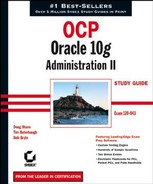C
- calendaring syntax
A powerful, flexible mini-language used to define repeat intervals for Oracle schedules. Repeat intervals can also be defined using PL/SQL expressions.
- case-insensitive sort
A sort operation that uses information about base letters and diacritics (accents) but not case.
- channel allocation
A method of connecting Recovery Manager (RMAN) and the target database while also determining the type of I/O device that the server process will use to perform the backup or restore operation.
- channel control options or commands
These options or commands are used to control operating system resources that Recovery Manager (RMAN) uses when performing RMAN operations.
- channel fail over
The automated process that Recovery Manager (RMAN) uses to identify another channel and continue with the restore or backup operation instead of failing.
- character semantics
The treatment of strings as a sequence of characters, regardless of byte size.
- character set
A collection of characters that represent textual information for one or more specific languages. Each character is encoded with a distinct character code.
- circular reuse records
Information used by Recovery Manager (RMAN) in the target database's control file that is not critical for RMAN to function and can be overwritten.
- cluster key
A unique key defined for a cluster that contains the common columns for all tables that will reside in the cluster.
- CMI
See Common Manageability Infrastructure.
- coarse striping
An ASM striping method for higher latency objects that uses a stripe size of 1MB.
- code point
The unique value assigned to each element in Unicode code sets. The code point value is used to determine the sorting order for the element within the code set.
- command-line interface (CLI)
The command-line interface to Recovery Manager that includes the BACKUP, RECOVER, and RESTORE commands.
- Common Manageability Infrastructure (CMI)
A sophisticated self-management infrastructure allowing the database to automatically resolve performance issues and to dynamically adjust to workload changes to ensure peak performance. The CMI is composed of the AWR, the advisory framework, Automated Maintenance Tasks, and server-generated alerts.
- complex resource plan
Any resource plan that is referenced by independent resource plan directives is classified as a complex resource plan. It is the opposite of a simple resource plan, in which the plan directives are self-contained. See also simple resource plan.
- compressed backup
A new Oracle Database10g feature that actually compresses the backup to a smaller size. This feature is used with the BACKUP AS COMPRESSED BACKUPSET command.
- consumer group mapping
A method of automatically assigning consumer groups to user sessions based on session attributes.
- control file autobackup
The process that automatically makes a backup of the control file along with a backup of other database objects.
- CPU_MTH
The parameter used to define the resource scheduling method used within a resource group. This method governs only CPU resources.
- cumulative incremental backup
A type of incremental backup that backs up all blocks changed since the last level 1 incremental backup.
